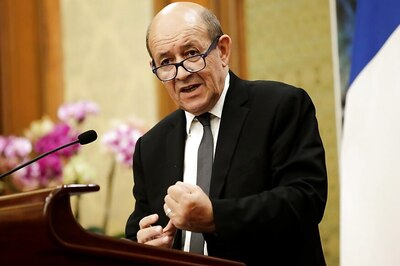
views
The Chinese Communist Party’s (CCP) relation with Palestine has been cordial since the People’s Republic of China came into being under Mao Zedong’s leadership. The Palestine Liberation Organisation (PLO), since its inception in 1964, has received Chinese recognition and support as well as both financial and military assistance from the CCP. China also happens to be among one of the first countries to recognise the sovereignty of Palestine in 1988, establishing full diplomatic relations the following year.
On the other hand, China entered into formal diplomatic relations with Israel in 1992, as part of its economic reforms process. Despite China’s pro-Palestinian leaning, bilateral trade between China and Palestine was only $158 million as compared to Chinese investment in Israel which was $23 billion last year. Beijing being Israel’s second largest trading partner after the US clearly denotes its close relations with Israel, especially in areas of technology.
China’s relations with the Palestine continued with active engagements through official visits and dialogues on both sides. Mahmoud Abbas, the Palestinian leader and President of the Palestinian Authority (PA), has visited Beijing five times in the past two decades, the most recent being in June this year where Chinese President Xi Jinping announced to enter into a strategic partnership with Palestine.
A conflict marred region, Palestine has been identified by China for playing a role in its BRI project. In 2022, both signed an MoU on “on Matters of Common Interest under the Joint Construction of the ‘Belt and Road’ Initiative” with the aim of improving “policy communication, facility connectivity, unimpeded trade, financial integration, and people-to-people connections”.
One can easily discern that China’s intention of acting as a potential ‘peacemaker’ in the Israel-Palestine conflict stems from its larger intention of including this strategically significant region as part of its BRI, to further penetrate in the Middle East and establish its dominance where the US has built its position as the main global player.
In case of Israel-Palestine conflict, China’s stand has been clear during Abbas’s Beijing visit in June. China offered to facilitate peace talks between Israel and Palestine through its three-point solution; establishing an independent Palestinian state based on 1967 borders with East Jerusalem as the capital, increasing development and humanitarian assistance to Palestinians and creating the right conditions for peace talks to resume via large-scale international meetings. This is not the first time China has offered to mediate peace talks.
A decade earlier too, Xi Jinping proposed four-point plan to solve the Palestinian issue, affirming its support for a two-state solution based on Palestinians inalienable right to self-determination. In 2021, when violent escalations erupted in the region, Beijing proposed for immediate cease of “military and hostile actions” by both parties and especially suggested Israel to exercise “restraint in particular”, while calling on both parties to have a “direct dialogue” in China.
Hamas, the Palestinian militant group that has been controlling the Gaza Strip since 2007 has been designated as a terrorist organisation by many countries, including the US, Canada and the EU. China, however, refrained from such labelling and recognised Hamas as the legitimate elected political entity representing the Palestinian people in the Gaza Strip.
Therefore, during the recent (7 October) surprise violent attack by the Hamas on Israel witnessed since October 1973 War in Israel, when other countries were quick in their condemnations against Hamas’ violent attacks, deeming it to be terrorist attacks, China’s initial statement expressed “deep concern over the escalation of tension and violence” while calling on both parties to “exercise restraint and immediately end the hostilities”, and reiterating its belief that the fundamental solution to this conflict lies in the two-state solution and establishing an independent State of Palestine.
This statement was perceived to be much subdued by the experts which failed to condemn Hamas attacks and was subject of critics by Israeli officials. An official of Israel’s Embassy in Beijing called on China to take a much stronger position, urging its solidarity towards Israel and that “this is not the time for a two-state solution.” Moreover, China’s close relations with Iran, an open rival to Israel and known to be an ally of Hamas, is another cause of concern. Israel has called on Beijing to stop Iran from further escalation of the ongoing situation. Popular opinion on Chinese social media has been favouring towards Hamas in the latest Israel-Hamas War.
From China’s statement, it is clear that Beijing is going to maintain its traditional stance of tilting towards the Palestinian cause, despite international condemnation of Hamas attacks. This makes China’s ‘neutral’ image as a credible mediator in Israel-Palestine conflict questionable and further challenges Chinese-brokered deal to restore diplomatic relations between Iran and Saudi Arabia.
China’s interest in solving the Israel-Palestine issue is guided by its foreign policy’s objective to imprint its image as a rising superpower in the region that so far has been dominated by the US. China’ approach to ‘peace-making’ is a mere rhetoric, driven by its larger diplomatic aim to overtake its rival US in the global power game and have more active influence in West Asia.
















Comments
0 comment